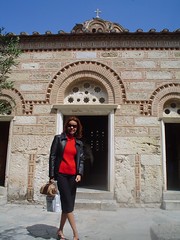Socrates / Plato / Aristotle / Trudeau
from A Young Person's Guide to Philosophy / DK Books
1. Socrates was a princely and successful teacher. T / F
2. When told that many regarded him as the wisest man in Athens, he responded that he worked hard at his tasks and humbly appreciated the praise. T / F
3. Socrates believed that happiness came to those who gave up material goods. T / F
4. His principal means of teaching was via lecture as he and his students walked around the city. T / F
5. Socrates was both supportive and antagonistic toward men in government. T / F
6. Socrates was atheistic. T / F
7. His dialogues with students were recorded by his pupil, Aristotle. T / F
8. He was a sophist, a commercial and independent teacher. T / F
9. His famous death potion was the poison called cyanide.
10. His style was similar to that of an aggressive journalist.
T / F
1. Plato was a disciple of Socrates who nevertheless was independent in his thought. T / F
2. Plato believed in democracy. T / F
3. He founded the first university, a school called the Academy. T / F
4. Plato’s school was famous but lacked balance by our standards. T / F
5. Plato considered the case for women’s rights and decided that that it was “not time for it.” T / F
6. The Muses were the leaders of the political scene that so dismayed Plato. T / F
7. Plato’s style of philosophical writing was that of the novelist.
T / F
8. Plato’s recommendation for the ideal government was one led by a philosopher-king. T / F
9. Plato was preceded by Socrates and followed by Aristotle. T / F
10. Plato was an idealist. T / F
1. Aristotle was a disciple of Socrates who nevertheless was independent in his thought. T / F
2. Aristotle might be called the Father of Science. T / F
3. Aristotle recognized the capabilities of women. T / F
4. He was not from Athens, but from a region near Macedonia. T / F
5. Aristotle had an enormous impact on history in general and Christianity in particular. T / F
6. Aristotle also created an institution called the Academy. T / F
7. He had a pupil of historic importance: Cleopatra VII.
8. Aristotle excelled at marine biology. T / F
9. Of the 3 great philosophers of ancient Greece, Aristotle has won the most respect and attention from the Western world. T / F
10. Would you say that his credibility was based solely on his observations in nature or was enhanced by the fact that he tutored one of the world’s conquering generals? Y / N
World Book: Soon after Alexander died in 323 B.C., Aristotle was charged with impiety (lack of reverence for the gods) by the Athenians. They probably resented his friendship with Alexander, the man who had conquered them. Aristotle had not forgotten the fate of the philosopher Socrates, condemned to death on a similar charge by the Athenians in 399 B.C. He fled to the city of Chalcis so the Athenians would not, as he said, "sin twice against philosophy." He died in Chalcis a year later.
Athenian Democracy
1. The ancient form of democracy was called Athenian because there were other types of government in places such as __ .
2. Athens itself had other types of government. T / F
3. What were the limitations of participation in Athenian democracy?
4. Was the Athenian military affected by democratic practice? Y / N
5. What is a *check* in regards political action?
6. Which of these words means to “send into exile,” or to “cast out?”
7. How might a playwright affect the government?
8. Greek democracy was practiced for some 1,200 years. T / F
9. What’s relatively odd about the number of participants in the political life of Athens?
10. Would Pericles have been the leader associated with the building of the Parthenon?
Socrates
1. F
2. F
3. F
4. F
5. T
6. probably F
7. F
8. F
9. F
10. T
Tuesday, March 13, 2007
Subscribe to:
Post Comments (Atom)


No comments:
Post a Comment